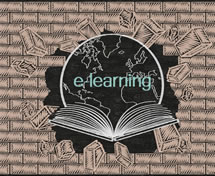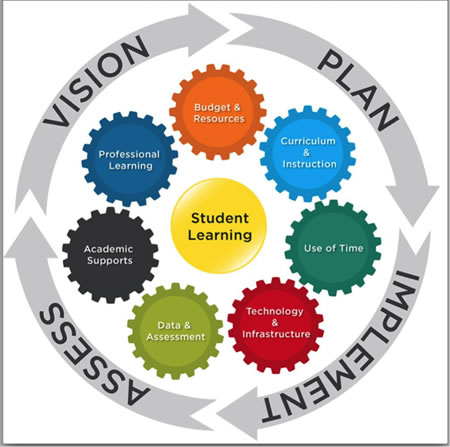New K-12 MOOC connects school and district leaders to implement digital learning initiatives
 A new, free Massive Open Online Course for Educators (MOOC -Ed), designed to help district and school leaders, will focus specifically on helping administrators effectively implement digital learning.
A new, free Massive Open Online Course for Educators (MOOC -Ed), designed to help district and school leaders, will focus specifically on helping administrators effectively implement digital learning.
The MOOC, “Planning for the K–12 Digital Learning Transition,” offered by the Friday Institute at NC State University and the Alliance for Excellent Education (AEE), began on September 30 and will continue for the next eight weeks.
This course is designed for busy district, school, and teacher leaders and teams; thus, the MOOC is structured enough to help guide administrators through the content, but accommodates a demanding schedule. This MOOC-Ed will help district leaders “understand the potential of digital learning in K–12 schools; assess progress and set future goals for their schools or districts; and develop a plan to achieve those goals,” said Project 24, which is part of AEE.
(Next page: Topics covered in the MOOC)
The MOOC is a good platform for collaboration-based professional development because “it’s self-directed with lots of opportunities for engagement,” explained Glenn Kleinman, executive director of the Friday Institute and professor of Educational Leadership and Policy Studies at the North Carolina State University College of Education. “Participants are encouraged to develop their own learning path since their aren’t rigid guidelines…we know that everyone is at different point of digital learning implementation. There’s also a flexible timing schedule and peer-supported learning through tips and constructive feedback from other K-12 leaders and administrators.”
Topics covered in the MOOC
The MOOC is based on the framework developed by AEE as part of Project 24’s work with the Friday Institute:
The framework, “Digital Transition Vision-Plan-Implement-Assess cycle” focuses on the seven digital learning technology planning elements, which are all centered on improving student learning:
1. Budget & Resources
2. Curriculum & Instruction
3. Use of Time
4. Technology & Infrastructure
5. Data & Assessment
6. Academic Supports
7. Professional Learning
“It’s important to look carefully at this framework,” said Mary Ann Wolf, CEO of Wolf Ed and education consultant, “to see not only what you need to do for digital learning in each of those areas, but also how they work together.”
(Next page: MOOC goals and registration)
According to Wolf, there are three main goals for participants of the MOOC: understand the potential of digital learning in K-12 education; assess progress and set future goals for schools and districts; and plan how leaders and their colleagues will proceed to achieve those goals.
The MOOC will also separate into two parts:
1. “Where are we heading?” This will provide a global snapshot of digital learning initiatives. This first part will help administrators understand the impact on both what students need to learn and how learning can take place. Participants will also discover lessons learned from those who have digital learning transition well underway, and will develop a set of goals for digital learning for their own school or district.
2. “How do we get there?” This will help administrators begin implementation. Participants will learn elements of a successful digital learning transition and effective strategies for addressing each. They also will learn about processes and tools that help support planning, implementing, and evaluating digital learning. Finally, leaders will develop and action plan to meet their school or district digital learning goals.
“MOOC participants can expect each week to review video and text resources, watch Google Hangouts of expert panelists, and participate in discussions with peers and experts, which include guiding questions for participants for each unit, as well as a chance for participants to create their own development questions,” explained Wolf. “Two-to-three hours spent per unit is an ideal time.”
For more information, see:
- #4: 25 education trends for 2018 - December 26, 2018
- Video of the Week: Dealing with digital distraction in the classroom - February 23, 2018
- Secrets from the library lines: 5 ways schools can boost digital engagement - January 2, 2018


